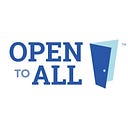DEI-Driven Community Engagement: A Blueprint to Success for Businesses
Throughout the decades, retail spaces have remained at the forefront of communities. Their physical locations, including malls and shopping centers, have long served as social gathering spaces. From the electronics retailer holding tech support workshops for seniors to the bookstore hosting weekly children’s storytime, these retailers are deeply woven into the fabric of their communities.
Connecting with the community is critical to success in an era of increased e-commerce sales and store closures. To excel in this new age of retail, businesses must value, and be reflective of, the diverse communities they serve. Recently, Open to All hosted a panel discussion in which leaders from Ben Bridge Jeweler, CBL Properties, and PetSmart Charities shared how they’ve built deeper community ties by establishing connections, creating opportunities, and transforming industries.
Establish Connections
Businesses can cultivate relationships in a variety of ways, from donating products to local schools, nonprofit organizations, and events to speaking up about social issues. For those just beginning to form community connections, start by determining the immediate needs of your neighbors. You can do so by partnering with nonprofits or meeting with local leaders. Once these needs are identified, it’s important to consider how they align with your company’s values. Then, you can identify how to best uplift these values in the neighborhoods and regions you serve. Brands can show support by sponsoring or partnering with local organizations, schools, sports leagues, and other community stakeholders.
These newly developed connections can often lead to unexpected findings. PetSmart Charities, whose four-year veterinary grant program dedicates an entire year to developing deeper understandings of communities, offered a great example of this during our briefing. Historically, the animal welfare industry has assumed that spay and neuter procedures were the services underserved communities needed most. However, PetSmart Charities’ grantees recently discovered that this is not the case. In reality, flea and tick control were the most requested services by pet owners, as this condition can severely limit one’s relationship with their pet. By actively listening to your communities, businesses can identify unmet needs, emerging trends, and areas for innovation that might have otherwise remained hidden.
Create Opportunities
Beyond the pursuit of profit, businesses have the unique capacity to catalyze positive change by reinvesting in the very communities that support them. Take, for example, CBL Properties, which began hosting minority-owned business expos to break down systemic barriers that have historically prevented business owners from expanding into physical retail spaces. CBL’s Black-Owned, Women-Owned, and Veteran-Owned Expos welcome small businesses to test out selling in a mall, witness the benefits of foot traffic, and connect with future growth opportunities. CBL Properties found many business owners left the expos prepared to move forward with pursuing a brick-and-mortar location. These events are just part of CBL’s strategies to consciously dispel the narrative that the mall is not suited for small businesses.
Educational opportunities are another way to support community members in need. The Lonia Tate Scholarship, sponsored by Ben Bridge Jeweler, funds a Graduate Gemologist Program and offers an internship at Ben Bridge for a minority candidate interested in pursuing a career in jewelry. Named in remembrance of Ben Bridge Jeweler’s long-term associate, the funding opportunity honors Lonia Tate’s passion for both fine jewelry and community service.
When businesses engage in philanthropic projects, develop educational programs, or provide job opportunities, they contribute to the overall vitality of their surroundings. By doing so, they foster a sense of interconnectivity, boost local economies, and inspire others to do the same.
Transform Industries
Once a company develops a deeper understanding of the communities they serve, they can use their learnings to generate industry-wide advancements. Industries are rife with antiquated assumptions that limit potential. These biases can deter diverse voices and perspectives, which hinders the exploration of new approaches and solutions. We can redefine industry standards, challenge norms, and deconstruct institutional biases by focusing on combating misconceptions and growing knowledge outside of our companies.
For example, CBL Properties is a part of the commercial real estate industry, which historically lacks diversity in all areas, from contractors to tenants. As CBL worked to intentionally expand access to their properties, the company discovered that many industry-wide procedures can be exclusionary to underserved communities. CBL Properties recently hosted an internal conference on cultural competency and humility, which covered topics ranging from providing important documents in native languages to accommodating varying cultural or religious calendars.
While the services these industries offer vary, the issue of industry-wide misconceptions remains consistent. Ben Bridge Jeweler recognizes that not only has the fine jewelry field long been dominated by a select few, but there’s also a lack of accessible avenues for newcomers to join the industry. To create pathways to success, Ben Bridge has collaborated with the Black in Jewelry Coalition to elevate intentional inclusivity throughout the entire industry. In addition to their Lonia Tate Scholarship, Ben Bridge also offers scholarships and apprenticeships that make it possible for people from underrepresented populations to pursue watchmaking. To generate a larger, industry-wide impact, Ben Bridge Jeweler’s watchmakers regularly host seminars at North Seattle College’s Watch Technology Institute.
Similarly, PetSmart Charities operates within the animal welfare sector, where 93.3% of veterinarians are white while pet parents are overwhelmingly people of color. PetSmart works to prioritize diversity, equity, and inclusion within the veterinary profession by funding educational opportunities for students from historically underrepresented identities and offering grants to nonprofits caring for underserved neighborhoods.
From main streets to malls, businesses can be found everywhere. But, becoming part of a community, rather than merely existing within one, necessitates intentional and authentic engagement on a brand’s behalf. A company can generate significant change not just in their community, but also in their industry, by recognizing biases, establishing relationships, and encouraging learning.
